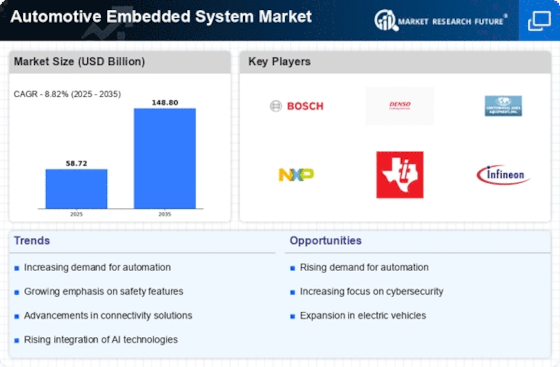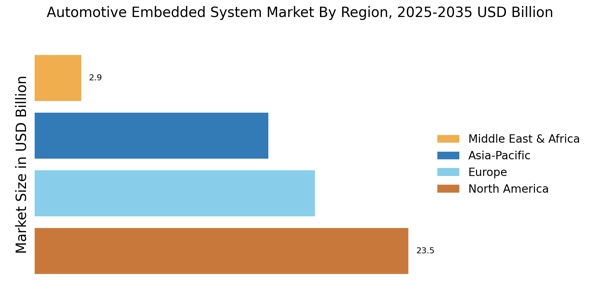Growing Focus on Electric Vehicle (EV) Technology
The Automotive Embedded System Market is significantly influenced by the growing focus on Electric Vehicle (EV) technology. As governments and consumers alike prioritize sustainability, the demand for EVs is escalating. Recent statistics indicate that EV sales are projected to account for over 30% of total vehicle sales by 2030. This shift necessitates the development of advanced embedded systems that can manage battery performance, energy efficiency, and charging infrastructure. Consequently, automotive manufacturers are investing heavily in the integration of embedded systems that support electric drivetrains and enhance vehicle performance. The Automotive Embedded System Market is thus poised for growth as it adapts to the evolving landscape of electric mobility, ensuring that vehicles are equipped with the necessary technology to meet future demands.
Regulatory Compliance and Environmental Standards
The Automotive Embedded System Market is increasingly shaped by stringent regulatory compliance and environmental standards. Governments worldwide are implementing regulations aimed at reducing emissions and enhancing vehicle safety. For instance, the European Union has set ambitious targets for reducing CO2 emissions from vehicles, which is driving manufacturers to adopt advanced embedded systems that comply with these standards. The market for automotive embedded systems is projected to grow as companies invest in technologies that not only meet regulatory requirements but also enhance vehicle performance. This focus on compliance is likely to spur innovation within the Automotive Embedded System Market, as manufacturers seek to develop systems that are both environmentally friendly and technologically advanced.
Integration of Artificial Intelligence and Machine Learning
The integration of Artificial Intelligence (AI) and Machine Learning (ML) into automotive embedded systems is transforming the Automotive Embedded System Market. These technologies enable vehicles to process vast amounts of data in real-time, enhancing decision-making capabilities and overall performance. The market for AI in automotive applications is anticipated to reach USD 10 billion by 2026, reflecting a growing recognition of the potential benefits. AI-driven systems can optimize navigation, improve predictive maintenance, and personalize user experiences, thereby increasing consumer satisfaction. Furthermore, as the automotive sector moves towards automation, the reliance on AI and ML is expected to intensify, leading to more sophisticated embedded systems that can adapt to various driving conditions and user preferences.
Rising Demand for Advanced Driver Assistance Systems (ADAS)
The Automotive Embedded System Market is experiencing a notable surge in demand for Advanced Driver Assistance Systems (ADAS). This trend is primarily driven by the increasing emphasis on vehicle safety and the reduction of road accidents. According to recent data, the ADAS segment is projected to grow at a compound annual growth rate (CAGR) of approximately 10% over the next five years. This growth is indicative of a broader shift towards integrating sophisticated embedded systems that enhance vehicle functionality. As manufacturers strive to meet regulatory requirements and consumer expectations, the incorporation of features such as lane-keeping assistance, adaptive cruise control, and automatic emergency braking becomes paramount. Consequently, the Automotive Embedded System Market is likely to witness substantial investments in research and development to innovate and refine these technologies.
Increased Connectivity and Vehicle-to-Everything (V2X) Communication
The Automotive Embedded System Market is witnessing a paradigm shift towards increased connectivity, particularly through Vehicle-to-Everything (V2X) communication. This technology facilitates seamless interaction between vehicles, infrastructure, and other road users, enhancing safety and traffic management. The V2X market is expected to grow at a CAGR of around 20% in the coming years, driven by the need for smarter transportation systems. As cities become more congested, the integration of embedded systems that support V2X communication is becoming essential. These systems can provide real-time data on traffic conditions, enabling vehicles to make informed decisions. Consequently, the Automotive Embedded System Market is likely to see a surge in demand for solutions that enhance connectivity and improve overall driving experiences.
















